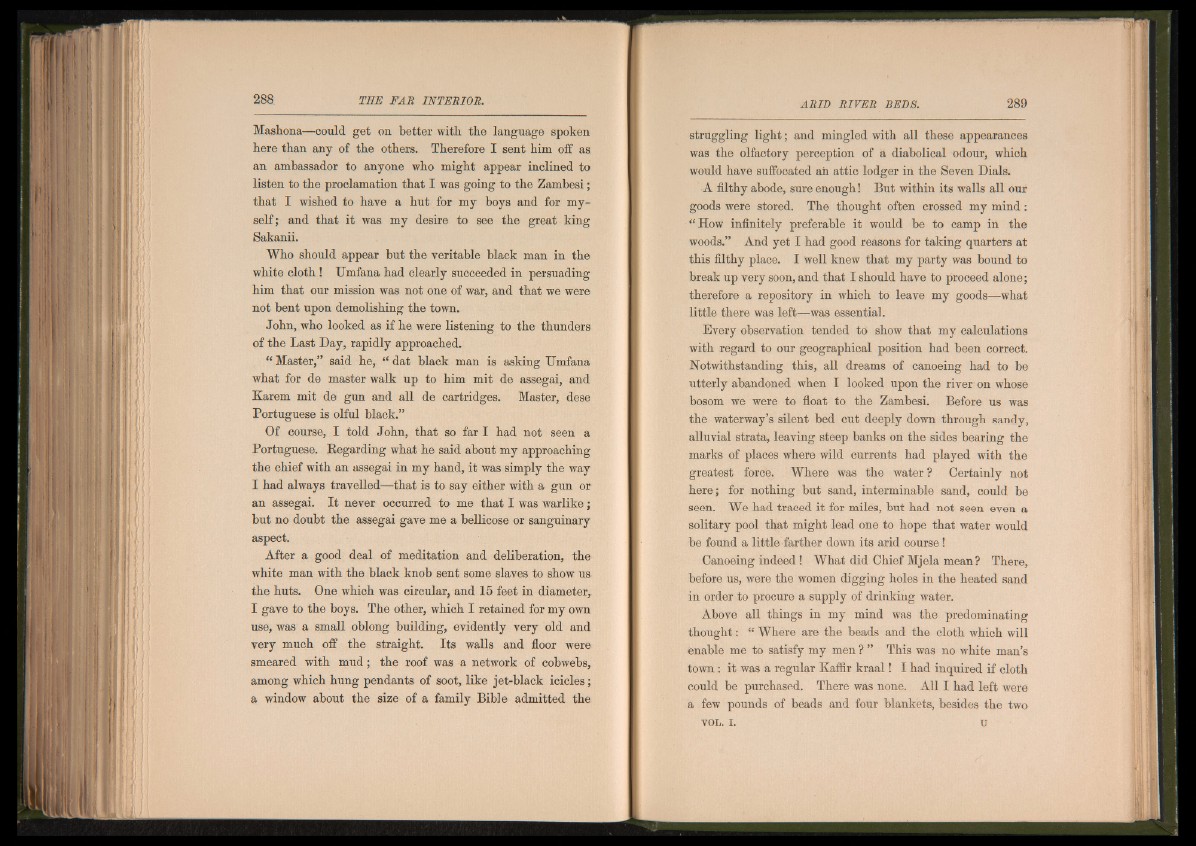
Mashona—could get on better witli the language spoken
here than any of the others. Therefore I sent him off as
an ambassador to anyone who might appear inclined to
listen to the proclamation that I was going to the Zambesi;
that I wished to have a hut for my boys and for myself;
and that it was my desire to see the great king
Sakanii.
Who should appear but the veritable black man in the
white cloth ! Umfana had clearly succeeded in persuading
him that our mission was not one of war, and that we were
not bent upon demolishing the town.
John, who looked as if he were listening to the thunders
of the Last Lay, rapidly approached.
“ Master,” said he, “ dat black man is asking Umfana
what for de master walk up to him mit de assegai, and
Karem mit de gun and all de cartridges. Master, dese
Portuguese is olful black.”
Of course, I told John, that so far I had not seen a
Portuguese. Eegarding what he said about my approaching
the chief with an assegai in my hand, it was simply the way
I had always travelled—that is to say either with a gun or
an assegai. I t never occurred to me that I was warlike;
but no doubt the assegai gave me a bellicose or sanguinary
aspect.
After a good deal of meditation and deliberation, the
white man with the black knob sent some slaves to show us
the huts. One which was circular, and 15 feet in diameter,
I gave to the boys. The other, which I retained for my own
use, was a small oblong building, evidently very old and
very much off the straight. Its walls and floor were
smeared with mud; the roof was a network of cobwebs,
among which hung pendants of soot, like jet-black icicles;
a window about the size of a family Bible admitted the
struggling light; and mingled with all these appearances
was the olfactory perception of a diabolical odour, which
would have suffocated an attic lodger in the Seven Dials.
A filthy abode, sure enough! But within its walls all our
goods were stored. The thought often crossed my mind :
“ How infinitely preferable it would be to camp in the
woods.” And yet I had good reasons for taking quarters at
this filthy place. I well knew that my party was bound to
break up very soon, and that I should have to proceed alone;
therefore a repository in which to leave my goods—what
little there was left—was essential.
Every observation tended to show that my calculations
with regard to our geographical position had been correct.
Notwithstanding this, all dreams of canoeing had to be
utterly abandoned when I looked upon the river on whose
bosom we were to float to the Zambesi. Before us was
the waterway’s silent bed cut deeply down through sandy,
alluvial strata, leaving steep banks on the sides bearing the
marks of places where wild currents had played with the
greatest force. Where was the water ? Certainly not
here; for nothing but sand, interminable sand, could be
seen. We had traced it for miles, but had not seen even a
solitary pool that might lead one to hope that water would
be found a little farther down its arid course!
Canoeing indeed ! What did Chief Mjela mean? There,
before us, were the women digging holes in the heated sand
in order to procure a supply of drinking water.
Above all things in my mind was the predominating
thought: “ Where are the beads and the cloth which will
enable me to satisfy my men ? ” This was no white man’s
town : it was a regular Kaffir k ra a l! I had inquired if cloth
could be purchased. There was none. All I had left were
a few pounds of beads and four blankets, besides the two
vol. x. x;